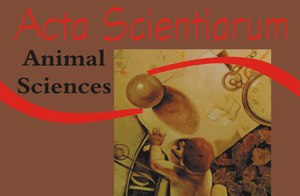ABSTRACT.
The purpose of the current study was to evaluate the in vitro fermentation (IVRF) and apparent in vivo digestibility (AIVD) of diets formulated with four inclusion levels of babassu mesocarp meal (BMM) (0.0; 7.5; 15.0 and 22.5%) in ewe lambs. The IVRF test was performed through the "Hohenheim Gas Test" technique, following a randomized complete block design, with four blocks (rumen fluids from four different bovines). Gas production was measured at 3, 6, 9, 12, 24, 48, 72, and 96 hours after incubation. For the AIVD trial, 20 ewe lambs were used in a completely randomized design with five replicates. The animals were housed in metabolic cages during the digestibility test. Diets with BMM showed lower fermentation levels than those without BMM. The BMM reduced the gas production per incubation time and dry matter effective degradability (DMED), possibly due to its chemical characteristics, or even to the influence of other factors, such as physical properties. The BMM negatively influenced the AIVD of DM. Thus, it can be stated that, despite being a starch source, BMM reduces ruminal fermentation parameters when included in ruminant diets, negatively interfering with diet digestibility. Therefore, its use should be cautious.
Keywords:
byproducts; feeding; rumination; sheep
